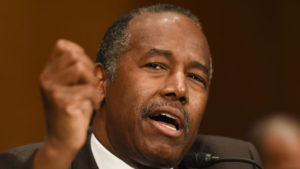 An hour after Donald Trump assumed the presidency Friday, his administration indefinitely suspended a pending rate cut for mortgage insurance required for FHA-backed loans, which are popular with first-time home buyers and those with poor credit.
An hour after Donald Trump assumed the presidency Friday, his administration indefinitely suspended a pending rate cut for mortgage insurance required for FHA-backed loans, which are popular with first-time home buyers and those with poor credit.
The move by the Department of Housing and Urban Development — one of the first acts of Trump’s administration — reversed a policy announced in the waning days of the Obama presidency that would have trimmed insurance premiums for typical borrowers by hundreds of dollars a year.
Some Republicans expressed concern that the rate cut could cost taxpayers if the loans started to go sour and the Federal Housing Administration was unable to cover the losses. The agency needed a $1.7-billion bailout from the U.S. Treasury in 2013 after it expanded its role last decade after the collapse of the subprime mortgage market.
The FHA does not issue loans, but instead insures mortgages and collects fees from borrowers to reimburse lenders in case of default. Borrowers can qualify for an FHA-backed mortgage, with down payments as small as 3.5%, even with a credit score as low as 580, which could signal a past bankruptcy or debts sent to collection.
The average credit score of an FHA borrower in the third quarter of last year was 679, a credit worthiness considered to be fair.
FHA-backed loans have seen robust growth in recent years and lenders not chartered as banks now control a majority of the riskier FHA market. The shift toward nonbank lenders also has drawn concerns because banks have strict reserve requirements while the crop of new lenders operates under a variety of business models.
Last week, during a confirmation hearing for Trump’s nominee for HUD secretary, Ben Carson, Sen. Pat Toomey (R-Pa.) argued that private mortgage insurance should play a larger role in the market for homes acquired by buyers who can’t afford traditional 20% down payments.
Carson appeared open to such a possibility and told Toomey it didn’t matter what entity provided insurance, but “we do have to have a mechanism, backstop.”
Carson also said he was surprised by the recent FHA rate cut and promised that if confirmed he would work with the “FHA administrator and other financial experts to really examine that policy.”
The suspension of the rate cut, set to take effect Jan. 27, came before his confirmation vote.
In a letter announcing the suspension Friday morning, HUD, which oversees the FHA, said more analysis is needed on any “future adjustments” to insurance premium rates. For most borrowers, the rate will now remain at 0.85%, rather than 0.60%.
“FHA is committed to ensuring its mortgage insurance programs remains viable and effective in the long term for all parties involved, especially our taxpayers,” the letter to the real estate industry said.
In cutting the insurance premium, the Obama administration had argued that the FHA’s finances had vastly improved since it received its first-ever bailout in 2013 to cover potential losses on the huge volume of low-down-payment mortgages it insured from 2007 to 2009 after the housing bust.
The administration noted that the agency’s Mutual Mortgage Insurance Fund’s capital reserve ratio exceeded requirements for the second year in a row.
“With sufficient reserves on hand to meet future claims, it’s time for FHA to pass along some modest savings to working families,” former HUD Secretary Julian Castro said in announcing the cut.
The suspension of that decision will be a disappointment to home buyers currently out shopping, especially on top of the rise in mortgage interest rates following the November election.
In Los Angeles and Orange counties, the limit on an FHA mortgage is $636,150.
If the planned reductions went into effect, borrowers who put down less than 5% on a $600,000, 30-year mortgage would have saved $1,500 a year. The Obama administration estimated that new FHA borrowers across the nation would have saved an average of $500 a year.
“That is real money,” Southern California mortgage broker Jeff Lazerson said.
Lazerson, president of Mortgage Grader in Laguna Niguel, said he had several clients who were putting off deals so they could get a cheaper insurance rate after Jan. 27.
“We got lots of calls,” he said.
In its letter announcing the suspension of the rate cut, HUD did not give a timeline for any coming decision and said the suspension was indefinite.
The California Assn. of Realtors called for the Trump administration to quickly review the rate reduction, noting it would have saved FHA-backed borrowers in California an average of $860 a year.
“FHA’s single-family home portfolio is financially sound as it has ever been, and we hope that once the new administration has thoroughly reviewed the merits of the premium reduction the suspension will immediately be lifted,” the association’s president, Geoff McIntosh, said in a statement.
[gravityform id=”22″ title=”true” description=”true”]

Leave a Reply